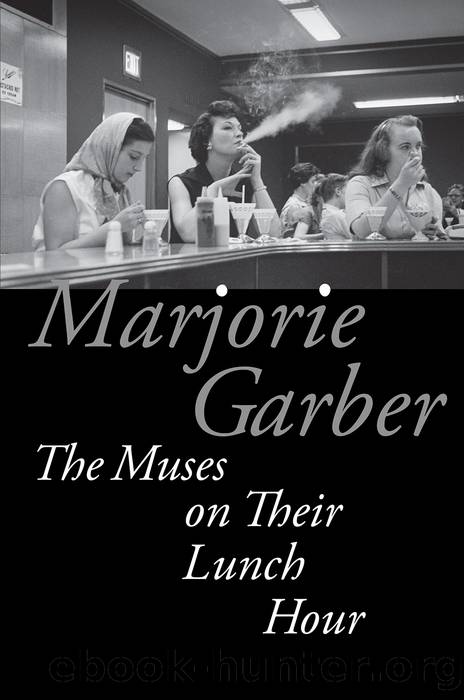The Muses on Their Lunch Hour by Garber Marjorie;

Author:Garber, Marjorie;
Language: eng
Format: epub
Publisher: Fordham University Press
Published: 2016-06-14T16:00:00+00:00
Kafka Goes to the Theater (a lot)
Leopards break into the temple and drink all the sacrificial vessels dry; it keeps happening; in the end, it can be calculated in advance and is incorporated into the ritual.
Kafka, Zürau Aphorisms, 20
Shakespeare, we think, read Ovid at the Stratford Grammar School. The evidence is writ large (and small) across the plays, from Titus Andronicus and A Midsummer Night’s Dream to Cymbeline and The Winter’s Tale.
Kafka almost surely did not read much Ovid, at least once he left the Gymnasium; as a young man, he trained first in chemistry and then took a degree in law. It’s likely he did not read Apuleius. Nor did he study Shakespeare in school, so far as we can tell, although as a child he had a “small album of pictures of women out of Shakespeare,” of which his favorite was Portia.28 (This was probably Mrs. Jameson’s Shakespeare’s Heroines: Characteristics of Women: Moral, Political, and Historical, which had been translated at least three times into German, was appended as a supplementary volume to the Schlegel/Tieck translated edition of Shakespeare’s works, and included a series of her own “vignette etchings.”)29
What he did do, though, was to go to the theater. He saw Hamlet several times, and writes in his diary about productions of King Lear, Twelfth Night, and Richard III; he probably saw The Comedy of Errors at the Kammerspiele in Berlin. One passage in his letters seems to echo the language of As You Like It. Another shows clearly that he knows Othello.30 The presiding genius of the German theater at that time was the director Max Reinhardt, whose productions Kafka saw both in Prague and in Berlin. Kafka’s Shakespeare was a theatrical Shakespeare, a Shakespeare mediated through actors.
After a recital by Alexander Moissi, a famous Austrian actor who starred in Reinhardt’s production of The Merchant of Venice as well as in a memorable production of Hamlet, Kafka noted in his diary that Moissi performed to “great effect” what he called “Shakespeare’s ‘Rain Song’ ” (that is, Feste’s song in Twelfth Night) as an encore-piece.31 (“He stood erect, was free of the text, pulled at his handkerchief and then crushed it in his hands, and his eyes sparkled.”)
Shakespeare—the Shakespeare of the theater—is regularly on his mind, and in his letters and diaries. When his mother and sister visited Berlin, Kafka decided which Shakespeare plays they should attend (he asked his then-fiancée to get them tickets to King Lear).
In an irritable account of a day so full of obligations that he couldn’t get any writing done, he mentions, among other tasks, that he brought his sister home after she saw Hamlet.32 When he visited Weimar in 1912, he toured the Goethe House and was shown the Shakespeare Monument,33 created in 1904 by Otto Lessing on the fortieth anniversary of the German Shakespeare Association. At one point he wrote a question to himself: “How could Fortinbras say that Hamlet had prov’d most royally?”34
Even when he fell ill, he wrote in his diary about Shakespeare:
27 February 1922.
Download
This site does not store any files on its server. We only index and link to content provided by other sites. Please contact the content providers to delete copyright contents if any and email us, we'll remove relevant links or contents immediately.
| Books & Reading | Comparative Literature |
| Criticism & Theory | Genres & Styles |
| Movements & Periods | Reference |
| Regional & Cultural | Women Authors |
4 3 2 1: A Novel by Paul Auster(11768)
The handmaid's tale by Margaret Atwood(7429)
Giovanni's Room by James Baldwin(6789)
Asking the Right Questions: A Guide to Critical Thinking by M. Neil Browne & Stuart M. Keeley(5340)
Big Magic: Creative Living Beyond Fear by Elizabeth Gilbert(5332)
Ego Is the Enemy by Ryan Holiday(4927)
On Writing A Memoir of the Craft by Stephen King(4651)
The Body: A Guide for Occupants by Bill Bryson(4565)
Ken Follett - World without end by Ken Follett(4431)
Bluets by Maggie Nelson(4246)
Adulting by Kelly Williams Brown(4218)
Eat That Frog! by Brian Tracy(4141)
Guilty Pleasures by Laurell K Hamilton(4105)
White Noise - A Novel by Don DeLillo(3821)
The Poetry of Pablo Neruda by Pablo Neruda(3804)
Fingerprints of the Gods by Graham Hancock(3727)
Alive: The Story of the Andes Survivors by Piers Paul Read(3718)
The Book of Joy by Dalai Lama(3678)
The Bookshop by Penelope Fitzgerald(3611)
